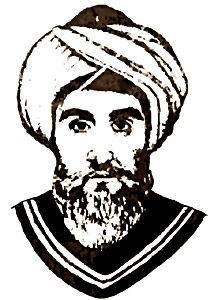The famous Sufi author of the thirteenth century, Mohiudin Ibn el-Arabi was born in Medinat Mursiya (presently known as Murcia) in Al-Andalus on July 28, 1165 CE. He lived a large part of his life in Sevilla, as his family moved to Sevilla when he was only eight years old. However, he left Liberia forever in 1200 CE, when he was thirty-five and his main intention behind this was to make the hajj to Mecca. While living near Mecca for three years, Ibn El-Arabi started writing one of his most famous works, named Al-Futuhat al-Makkiyya (The Meccan Illuminations). He again left Mecca in the year 1204 and went to Anatolia, along with Majd-al-Din Es`haq (Isaac). He finally moved to Damascus in 1223 and settled there for living the last seventeen years of his life
 Mohiudin Ibn el-Arabi is considered to be one of the greatest classical Sufi authors of the middle Ages and his life and writings are shown to have deeply penetrated the thought of East and West alike, in the modern times. Ibn El-Arabi was also popularly known to the Arabs as "Sheikh el-Akbar" (the Greatest Sheikh`) and to the Christian West by a direct translation of this title "Doctor Maximus". Mohiudin Ibn El-Arabi was a vastly prolific writer and is also generally known as the prime exponent of the idea that was known as Wahdat-ul-Wujood. However, Ibn El-Arabi himself did not use this term in his writings. He mainly emphasised on the true potential of the human being and the path to realising that potential and becoming the perfect or complete man.
Mohiudin Ibn el-Arabi is considered to be one of the greatest classical Sufi authors of the middle Ages and his life and writings are shown to have deeply penetrated the thought of East and West alike, in the modern times. Ibn El-Arabi was also popularly known to the Arabs as "Sheikh el-Akbar" (the Greatest Sheikh`) and to the Christian West by a direct translation of this title "Doctor Maximus". Mohiudin Ibn El-Arabi was a vastly prolific writer and is also generally known as the prime exponent of the idea that was known as Wahdat-ul-Wujood. However, Ibn El-Arabi himself did not use this term in his writings. He mainly emphasised on the true potential of the human being and the path to realising that potential and becoming the perfect or complete man.
Mohiudin Ibn El-Arabi has followed the path of writing books and mastery works for spreading his message to the people. Among the teachings of Mohiudin Ibn El-Arabi, the concept of three forms of knowledge is undoubtedly one of the most important ones. Ibn el-Arabi instructed his followers in this most ancient dictum and said that there are generally three forms of knowledge. He said that the first form is the intellectual knowledge that is in fact the only information and the collection of facts. According to him, this form is the use of the information and collection of facts for arriving at further intellectual concepts. He called this as intellectualism. While describing the second form of knowledge, Mohiudin Ibn El-Arabi said that the second one is the knowledge of states. He said that this includes both emotional feeling and strange states of being, where man thinks that he has perceived something supreme but cannot avail it. He identified this state as emotionalism. The third form of knowledge is the real knowledge. He said that this is called the Knowledge of Reality and in this form, man can perceive what is right, what is true, beyond the boundaries of thought and sense. According to Ibn El-Arabi, the scholastics and scientists mainly concentrate upon the first form of knowledge. He added that the emotionalists and experientialists use the second form and all the other people use the two combined, or either one alternately. However, he said that the people, who know how to connect themselves with the reality that lies beyond both these forms of knowledge, are those, who attain the truth. Ibn El-Arabi called these people as the real Sufis, the real dervishes.
Mohiudin Ibn El-Arabi discussed about the concept of love in his writings. He talked about the special love and stated that as the full moon appears from the night, so appears the face of the lover amid the tresses. He said that the perception of the lover comes from sorrow. According to Mohiudin Ibn El-Arabi, the common people think that a Sheikh should show miracles and manifest enlightenment. However, he thinks that the requirement in a teacher is only that he should possess all that the disciple needs.
Mohiudin Ibn El-Arabi never liked to talk in philosophical language with anyone, no matter how much ignorant or how much learned. El-Arabi`s concept of a Sufi was that the Sufi, who knows the Ultimate Truth acts and speaks in a manner that takes into consideration the understanding, limitations and dominant concealed prejudices of his audience. He said that to Sufis, worship means knowledge and he attains sight through knowledge. According to him, the real Sufi should abandon three `I` - he should not say `for me`, `with me` or `my property`. El-Arabi said that the Sufi must not attribute anything to himself. He said that there is something hidden in an unworthy shell and the people usually seeks lesser objects, heedless of the prize of unlimited value. To Ibn El-Arabi, the capacity of interpretation means that one can easily read something said by a wise man in two totally opposite manners.
Mohiudin Ibn El-Arabi died on November 10, 1240.



















